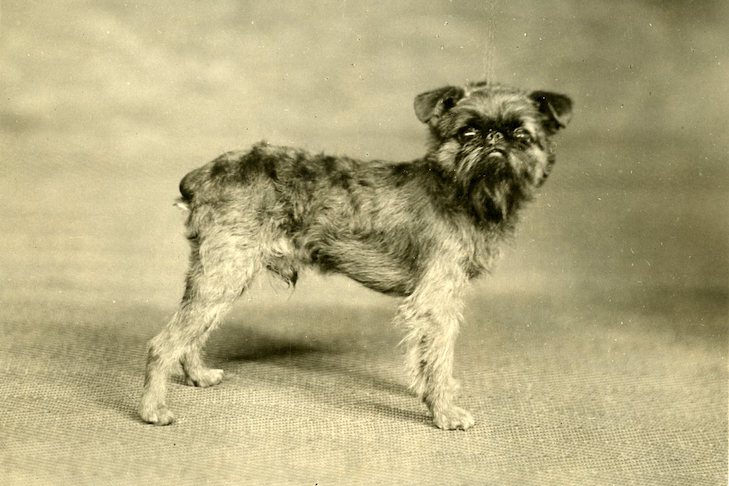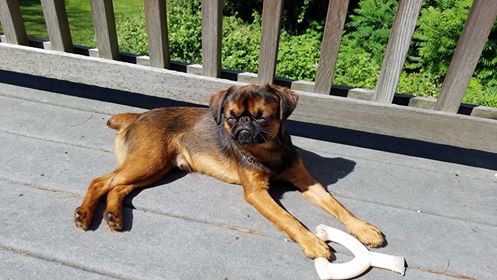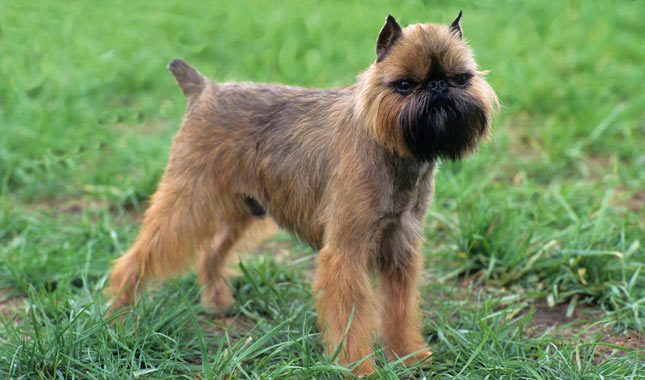The Brussels Griffon is a breed of toy , named for its origin in Brussels, Belgium. Originally bred to hunt and kill rats, the Brussels Griffon is now kept mostly as a companion dog. They are intelligent, alert, and lively little dogs with a big personality.
Brussels Griffon Overview

The Brussels Griffon is a sturdy, short-legged breed with a distinctive human-like face featuring large round eyes, a short black nose, and a prominent chin. Their coat is wiry and dense and comes in a variety of colors including red, black, black and tan, and red and black.
Adult Brussels Griffons stand about 7 to 10 inches tall at the shoulder and weigh 8 to 12 pounds. Despite their small size, they have a lot of energy and need daily exercise. But they are just as happy curling up next to their owner at the end of the day.
Pros of the Brussels Griffon
Affectionate Companions
Brussels Griffons are known for being deeply devoted and loving pets. They form extremely strong bonds with their families. Brussels Griffons just want to be close to their favorite people and that includes sitting on your lap whenever possible.
Minimal Shedding
The wiry coat of the Brussels Griffon sheds very little compared to other breeds. This makes them a good choice for those with allergies. Occasional brushing and clipping is all that’s required to keep their unique coat looking its best.
Get Along Well With Other Pets
Properly socialized Brussels Griffons generally mix well with other household pets. They don’t tend to be aggressive or territorial despite their history dealing with rodents. But as with any dog, supervision is still required when interacting with other animals.

Cons of the Brussels Griffon
Prone to Certain Health Issues
Brussels Griffons can be susceptible to certain medical conditions including eye abnormalities, patellar luxation, and spinal issues. Reputable breeders screen breeding dogs to minimize the chances of puppies developing genetic diseases later on.
Can be Stubborn
Brussels Griffons have a mind of their own. They are bright enough to learn commands and tricks easily but selective in obeying them. Early positive reinforcement training is important to establish good behavior patterns. Brussels Griffons respond better to praise then punishment during training.
Separation Anxiety
Brussels Griffons thoroughly enjoy being around their families at all times. When left alone for long periods, some Griffons may develop destructive separation anxiety. Crate training a Brussels Griffon puppy can help prevent separation issues as an adult dog. Rotating special chew toys also helps to ease boredom and anxiety.
Advice for Brussels Griffon Owners

Exercise Requirements
Brussels Griffons need up to an hour of vigorous activity every day. Short walks and indoor play sessions aren’t enough to satisfy their exercise needs. Interactive games of fetch along with longer walks, hikes or jogs are better choices for meeting a Brussels Griffon’s activity demands.
Mental Stimulation
In addition to physical activity, Brussels Griffons need plenty of mental stimulation too. Food puzzle toys, hide and seek games, learning tricks and commands all help keep a Brussels Griffon’s keen mind occupied and prevent boredom. Signing up for dog sports training classes is another great way to provide mental enrichment.
Grooming Tips
Brussels Griffons require regular brushing and combing, usually about 2 to 3 times per week. Clipping or trimming their facial hair every 4 to 6 is also advised. Cleaning inside wrinkles on their face helps prevent irritation and infection within skin folds. Nail trimming and teeth brushing must be part of a regular home grooming routine as well. Most owners have their Brussels Griffon professionally groomed about once every 8 to 10 weeks.
Comparisons

Brussels Griffon vs Affenpinscher
Both breeds sport unique coats and expressive faces. But while the Brussels Griffon and Affenpinscher may look alike, their personalities differ quite a bit. Brussels Griffons bond very closely with their families. Affenpinschers tend to be more independent. Brussels Griffons need lots of attention and playtime. Affenpinschers are lower maintenance and less demanding. Both make good watch dogs despite their small size.
Brussels Griffon vs Boston Terrier
Boston Terriers and Brussels Griffons are lively, comical breeds perfect for urban living. Boston Terriers shed more while Brussels Griffons require more intensive grooming. Boston Terriers tend to bark frequently. Brussels Griffons can be barkers too but not to the same degree. Both breeds get along well with older children. Brussels Griffons bond more intensely with their owners compared to the friendly yet independent Boston.
Brussels Griffon vs French Bulldog
The appeal of the Brussels Griffon and French Bulldog overlap in some ways. Both breeds are amusing companions with sweet, affectionate dispositions. But there are significant differences too. Brussels Griffons are more energetic, demanding daily vigorous exercise. Low key French Bulldogs better suit less active owners. Brussels Griffons are less prone to serious genetic health issues common in French Bulldogs. Neither breed does well when left alone for long periods.
Conclusion
Despite their small size, Brussels Griffons have larger than life free-spirited personalities. They need plenty of exercise and interactive playtime. Brussels Griffons thrive on being close to their owners throughout the day. They are sensitive, deeply devoted companions. For people desiring an affectionate lapdog that also enjoys staying actively engaged, the distinctive Brussels Griffon makes a perfect pet.